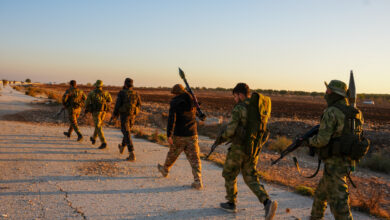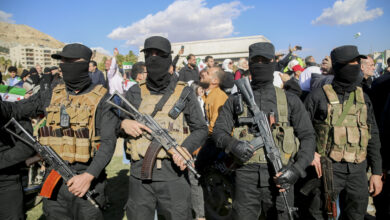Syria Blackout After Alleged ‘Terrorist’ Pipeline Attack
The pipeline explosion was the latest in a string of alleged attacks against the government's energy infrastructure.
War-torn Syria‘s government Monday blamed a “terrorist” attack on a gas pipeline near Damascus for a nationwide blackout, in the latest such alleged assault on its energy infrastructure.
Caretaker electricity minister Zuhair Kharboutli said a pipeline explosion in the Damascus area late Sunday “led to an electricity blackout across Syria”, according to state news agency SANA.
The caretaker oil and mineral resources minister, Ali Ghanem, said the explosion of the gas pipeline, between Adra and Dmeir, was “the result of a terrorist attack,” but provided no further details.
James Jeffrey, the US pointman on Syria, told journalists in Geneva that the US was still looking into who was responsible for the pipeline attack. “But it was almost certainly a strike by ISIS,” Jeffrey said, using an acronym for the Islamic State jihadist group.
Kharboutli said the explosion was the “sixth of its kind on the pipeline in that area,” without giving a timeframe.
SANA published pictures of firefighters working to put out a blaze, followed by images a mangled land pipeline missing a large chunk.
Damascus residents told AFP they woke up on Monday with no electricity in their homes.
Mid-morning, Kharboutli told SANA that power had started to partially return to several provinces and had been restored to parts of central Damascus.
“Power has returned to several vital installations in Damascus including hospitals and some residential neighborhoods,” he said.
The Russia and Iran-backed Damascus government in 2018 expelled the last rebels and jihadists from Dmeir, a town about 40 kilometers (25 miles) northeast of Damascus.
But IS retains a presence in the vast Badia desert east of the town.
Jeffrey on Monday said that: “In Syria, particularly the Badia Desert south of the Euphrates… we’re seeing an upsurge of ISIS activity.”
The Syrian Observatory for Human Rights said it was not immediately clear who was behind the overnight attack that had caused several explosions between Adra and Dmeir that were so loud they could be heard in Damascus.
A host of pro-government forces are stationed in the area, said the Britain-based war monitor.
Russian forces are present at the Dmeir military airport, while Iranian forces and allied fighters held positions around the town and on the edge of the Badia desert.
Rockets, Frogmen
The pipeline explosion was the latest in a string of alleged attacks against the government’s energy infrastructure.
In February, the government said “terrorists” attacked four different oil and gas facilities with rocket fire in the central province of Homs.
In January, it said divers had planted explosives on offshore pipelines in the Mediterranean Sea of the Banias refinery, but that the damage had not halted operations.
In June 2019, Damascus said an unnamed foreign party had attacked and damaged six underwater pipelines connecting oil tankers to the Banias terminal.
There was no immediate claim of responsibility for any of those attacks.
Government-held areas of Syria have suffered repeated power cuts in recent years, with the authorities last month blaming the electricity rationing on Western sanctions and on a “sharp rise in temperature.”
In April, the oil ministry said power cuts were due to the “security situation in the Badia region,” leading to the suspension of work at several gas wells there.
Syria’s war has killed more than 380,000 people and displaced more than half the pre-war population since it started in 2011 with the repression of anti-government protests.
It has also caused the Damascus regime to lose control of key oil fields, and caused state hydrocarbon revenues to plummet by billions of dollars.
Syria’s electricity sector has made losses of $4 billion since 2011, Syrian official media said late last year. Up to 70 percent of transmission stations and lines were knocked out of action due to the conflict, the same source said.












